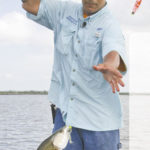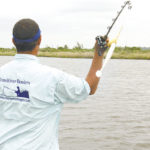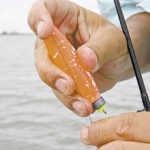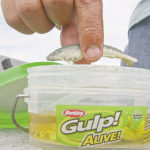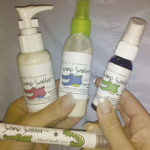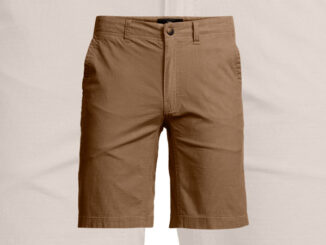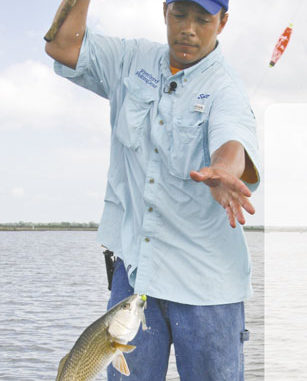
Leave your gas card at home, and take a short boat ride to the fish-filled waters of Lake Boudreaux.
I love my wife, but she seems to have an uncanny ability of calling my name just as my rump lands in my recliner or plops down on our bed.
I didn’t feel the same amount of restrained rage at Scott Walker when he announced we were at Lake Boudreaux before his boat seat could even conform to my caboose, but it was close.
Couldn’t I even enjoy my early morning boat ride?
But then I thought about what that quick of a ride must have cost — or didn’t cost — Walker.
After passing shocking gas-station sign after shocking gas-station sign on my way to Cocodrie, it dawned on me that such a short boat ride meant Walker, who travels from his home in Norco, could fish all week long without having to fill up his boat before every trip.
“That’s pretty nice the way the economy is,” Walker agreed. “For anybody who doesn’t want to burn a whole lot of gas, Lake Boudreaux is five minutes from the road. The launch is right there, and there are a ton of redfish back here. And you don’t have to burn any gas — and I don’t like to burn gas.”
The road Walker mentioned is LA-56 that runs from Houma down through Chauvin and on to Cocodrie. And the launch is the ramp to the east just after you cross Boudreaux Canal.
After launching there, Walker and I idled north in Bush Canal and turned west into Boudreaux Canal. We passed under the draw bridge that crosses Boudreaux Canal, and were almost immediately in Lake Boudreaux.
Walker made a quick run to the northeast section of the lake, and we were already in redfish within a mile and a half of the ramp. Assuming we could catch a limit of redfish at our first stop, burning a grand total of three miles worth of gas made Lake Boudreaux look like one of the best locations this summer for anglers on an ever-tightening fuel budget.
Back in the spring, Walker could catch speckled trout with his redfish when the fish were still inside. However, by the time summer rolls around, most of the trout will have moved back toward the coast.
“The trout bite may slow down, but the redfish bite only gets better,” Walker insisted. “Grass beds grow all around the northern part of Lake Boudreaux, and the water really clears up. That makes it a perfect spot for sight-fishing reds, but you can still wear them out on spinnerbaits and Gulp shrimp under a popping cork.”
By the time I could get up from my seat and grab my fishing rod, Walker was already slinging a Strike King Redfish Magic spinnerbait with a white body toward some broken marsh. Needing a smashing topwater strike to stun me to my senses, I decided to go with a MirrOlure Top Dog Jr.
A crushing topwater strike on my third cast did more to wake me up than a whole case of Walker’s Monster energy drinks would have. If this was the kind of action to be found in Lake Boudreaux just a little more than a mile from the ramp, I quickly decided this was my new favorite place to fish.
This first fish of the morning confirmed something Walker had told me earlier.
“For some reason, the fish have not been right up on the bank,” he had explained. “Lone redfish have been about 10 to 15 feet out from the grass.”
Over the next 30 minutes, Walker hooked, landed and released several rat reds that were under 16 inches. The spinnerbait had been so successful for him on some trips before this one that he had a hard time putting it down even though something was telling him to pick up his popping cork rod rigged with a natural-colored Berkley Gulp Alive shrimp.
“They’ve been feeding on crabs back in here, and that’s why the Gulp works so good,” Walker theorized. “I cleaned a big red the other day that had a five or six crabs in its stomach, and that fish was still wanting to eat. Plus, I’ve seen a lot of these reds spitting up small crabs right by the boat.”
Walker immediately kicked his trolling motor on high to get away from a straight bank that we found ourselves fishing. Being that the north side of Lake Boudreaux is a maze of broken marsh and points, he didn’t see any reason to stick around such a featureless stretch of straight shoreline.
And it wasn’t long before his orange popping cork started disappearing, and it was obvious that the larger redfish were keying in on the smell of the Gulp rather than the vibration of the spinnerbait blade.
I didn’t know it at the time, but Walker was starting an on-the-water clinic in catching redfish at Lake Boudreaux. For every one bite I got, his cork went under five times. In a desperate attempt to catch up, I switched back and forth between the topwater, spinnerbait and my own chartreuse Gulp Swimming Mullet under a Bomber Paradise Popper X-Treme cork.
“Get you one of these natural Gulp shrimp,” Walker insisted in order to be a good host.
I did, but the drubbing continued. The only difference between what he was fishing and what I was fishing was our corks. Walker was fishing an orange cork that he buys three for $2 anywhere that sells fishing tackle.
No titanium wire. No green, red or blue clackers. No brass balls. It was just an orange cork with a slit in the side and a weight on the bottom. It clipped on like the yellow snap-on cork that many call a lemon drop, but this one was cigar-shaped rather than egg-shaped, and it was orange rather than yellow.
“There’s something about these corks,” Walker asserted. “Seems like everybody I take fishing winds up going and buying a bunch of them to put in their own tackle boxes.
“Like the lemon drop, it’s got a clip at the top and a clip at the bottom, but this one is weighted on the bottom. I don’t know if it’s the sound they make or what, but I’ve had more luck with this cork than any other cork I’ve fished.”
Almost as if he were rubbing it in, Walker’s explanation about his cork was punctuated by another keeper redfish that found the Gulp shrimp under Walker’s orange cork to its liking. I knew Walker had a few more of these corks in his boat, but I stubbornly insisted, much to my demise, that I didn’t need one.
After schooling me a while with his popping cork, Walker snuck up into a crystal-clear pocket that was ringed with grass. A few wakes far in the back corner gave away the location of a school of redfish, so Walker put down his popping cork rod and grabbed his spinnerbait rod again.
I could immediately tell that Walker’s first love had to be sight fishing. His entire demeanor changed as he perched as high as he could on his boat’s front deck to try to see the fish better. A school of reds boiled the surface right in front of him, and he could hardly contain himself.
“Look at all these fish,” he screeched. “And I can’t get any of them to bite the spinnerbait.
“Maybe the boat’s getting up too close to them, and we’re spooking them. I’m going to back off a little bit and throw a Gulp shrimp on just a jighead. They shouldn’t be able to pass that up.”
And the clinic continued.
We were so close to the highway that we could see cars passing the entire time we were fishing. And had Walker not cranked up to try to go find some trout, he wouldn’t have had to crank his big motor the entire time we were on the water.
And as good as the fishing was this day, Walker reiterated that the redfish bite would only get better into June and July after the grass really starts to mat out. About the only thing he will do differently during the summer is fish his Gulp shrimp tightlined on a jighead rather than under a cork.
“That’s when I’m going to put a little step ladder on my front deck and really go out looking for fish rather than blind casting the points and marsh grass,” Walker said. “The higher up I can get, the better I can see them. And if I can see them, most of the time I can catch them.”
So if you’re looking to spend more time fishing rather than pumping gas this summer, head down Highway 56 toward Cocodrie. You’ll still have to stop by the gas station, but only to stock up on snacks and energy drinks.
And Walker says if you’re fishing Lake Boudreaux for redfish this summer, you’re going to need all the energy you can get. But the fuel you can leave at the pump.
Chris Ginn has been covering hunting and fishing in Louisiana since 1998. He lives with his wife Jennifer and children Matthew and Rebecca along the Bogue Chitto River in rural Washington Parish.
